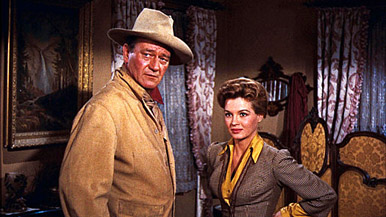Classic Movie Review: Rio Bravo
By Josh Spiegel
February 7, 2011
BoxOfficeProphets.com

So, we have Rio Bravo, the 1959 Western that would inspire horror-film director John Carpenter decades later to make a modern version, called Assault on Precinct 13. Rio Bravo is, among other things, a rebuke to the iconic and subtle 1952 Western High Noon, in which a sheriff tries, pretty much by himself, to take on a group of thugs who’ve cowed his town into submission. Some see the film as being a critique of McCarthyism and the blacklisting that occurred in Hollywood because of the Red Scare. Wayne is well-known for having been very conservative, and neither he nor director Howard Hawks enjoyed the idea of a sheriff needing to ask people to help him out. In Rio Bravo, the story is somewhat similar (bad guys are coming to town to free someone from the town jail, and Wayne’s tough sheriff plus a few wacky sidekicks aim to take them out), but slicker.
If there’s good to be had in Rio Bravo, it’s outside of Wayne’s typically bland performance as Sheriff John T. Chance. Chance has to face down the evil rancher Nathan Burdette, whose younger brother is currently biding his time in the local jail after killing someone at the beginning of the film. The story of Rio Bravo is pretty much just Chance figuring out how to take Burdette down without getting killed. Many critics have called Rio Bravo a classic, and there’s no question that the film has a certain timeless quality, in that many of its plot points can be — and have been — recycled in other films in other genres. Though the film has the qualities of a Western, you can transplant a lot of the ideas to pretty much any time and place.
What Rio Bravo provides is a cast of interesting side characters, even if their motivations are kind of weak. Playing a drunk who remembers his past glories and sees this current challenge as a way to revisit them, we have Dean Martin as Dude. Martin’s not bad here, but almost always, I kept asking myself the same question: why Dean Martin? Rio Bravo would be essentially remade by Hawks and Wayne years later as El Dorado, where Robert Mitchum played the drunk. Mitchum has stage presence that Martin doesn’t have. While Martin was a skilled performer with the Rat Pack, there’s never a moment in Rio Bravo where he doesn’t just seem like he’s acting. Wayne, at least, you could buy as having been around during the time when the film is set. Not so for Martin, whose presence is so obvious that it’s always distracting.
The character is written endearingly enough that it’s kind of forgivable that he’s being played by Dino, though. What the script—co-written by Leigh Brackett, who would later help write The Empire Strikes Back — does well is establish a group of characters whose traits are obvious without seeming too one-dimensional or predictable. We have Chance, a single-minded and tough guy; we have Dude, who wants to be redeemed but needs to redeem himself first; we have Stumpy (Walter Brennan), the lovable old coot; we have Feathers (Angie Dickinson), the smart young woman who’s tougher than she looks; and we have Colorado (Ricky Nelson), a brash upstart. While I could criticize the film for not being more three-dimensional, many great films whose job is first to solely entertain don’t dig deep with their characters, nor do they need to.
The biggest problem with Rio Bravo is the lack of a truly frightening villain. We are constantly being told about how tough Nathan Burdette is and why Chance should fear his, yes, chances of being able to take down this mean rancher. We know that Burdette has a lot of cronies and henchmen to do his dirty work, but Chance takes them down pretty quickly, because he’s John Wayne and of course he can take these guys down. The reality of the situation is the true problem: even though I’m watching this more than 50 years after it was released, I know that John Wayne is going to get the girl (yes, he and Angie Dickinson get involved in the movie) and beat the bad guys. There is zero tension here, and what’s more, the action in the nearly 150-minute-long film doesn’t get going for nearly two full hours, so there’s little shooting.
Some people love John Wayne, some people love his movies, and there are some people who just love entertaining films of any genre. I love a good movie like the next guy, but I was hoping for more from Rio Bravo. Plenty of respected critics have gone nuts for the movie, and while I can kind of see why, I wonder if part of it is just nostalgia for a simpler time at the movies. There’s nothing wrong with movies that only want to entertain you, but even then, I have to feel some suspense for the good guys. I know that John McClane is going to win in Die Hard, but the writers and directors keep us guessing as to how he’s going to survive. John Wayne’s characters got into some scrapes, but did you ever really think he’d get seriously hurt? Rio Bravo is a well-made Western, but it’s not as remarkable as I’d been led to believe.